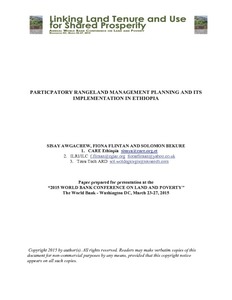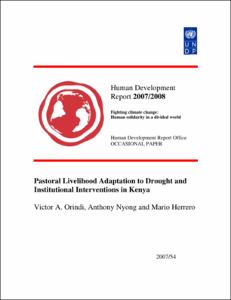Not by pastoralists alone... Pastoralists do not live in isolation. Responses to pastoralists' shocks should not be viewed in isolation either
Participatory investigation of relative incidence and impact on livelihoods of livestock diseases amongst the Turkana pastoralists in Kenya
Participatory modelling of pastoral and irrigated cropland ecosystems to identify linkages between environmental changes and local stakeholders’ health and well-being
Participatory rangeland management planning and its implementation in Ethiopia
The pastoral and agro-pastoral areas of Ethiopia cover around 65% of the country’s surface area. Rangeland resources are managed under collective common property arrangements, which are increasingly coming under pressure from both internal and external forces of change including alternative, but not necessarily ‘appropriate’, land uses.
Our land, our animals: Herding in Kenya's Kitengela rangelands
Nickson Parmisa, a resident of Kitengela just outside Nairobi in Kenya, talks about the challenges of livestock herding in the face of climate change.
Participatory analysis of vulnerability to drought in three agro-pastoral communities in the West African Sahel
Drought is one of the major climatic hazards impacting on the various sectors including crop and livestock in the West African Sahel. Pastoral and agro-pastoral communities in the region are regularly affected by drought, with vulnerability differing with gender, age, wealth status (access to cropland and livestock endowment), geographic location, social networks, and previous exposure to drought. Effective interventions require regular monitoring of vulnerability to drought, for which various quantitative and qualitative approaches exist.
Participatory definition of trait preference and pastorals’ indigenous knowledge on goat breeding strategy around Aysaita district, Ethiopia
Participatory disease searching using participatory epidemiology techniques in agropastoral and pastoral areas of Mbarara District, Uganda
Pastoral livelihood adaptation to drought and institutional interventions in Kenya
Pastoralist futures in Africa a balance between traditions and opportunities
ILRI's Augustine Ayantunde reflects on the recent conference in Addis Ababa on the future of pastoralism in Africa. He draws attention to the two major conference strands - on one side, the optimists, on the other 'doom and gloom.' One thing is clear, it is not really possible to generalise across regions. He concludes by suggesting that the future will lie in pastoralist communities being able to take advantage of present opportunities while also taking care of their traditions.









